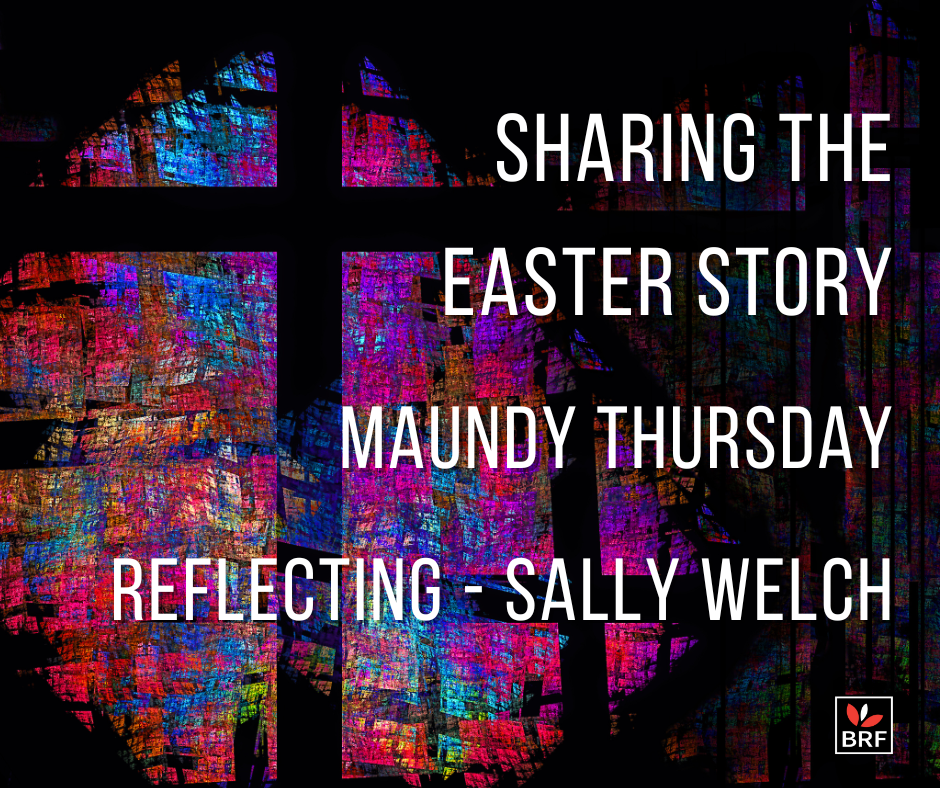Reflecting - Sally Welch - Sharing the Easter Story
Reflecting - Sally Welch - Sharing the Easter Story
Maundy Thursday
During supper Jesus, knowing that the Father had given all things into his hands, and that he had come from God and was going to God, got up from the table, took off his outer robe, and tied a towel around himself. Then he poured water into a basin and began to wash the disciples’ feet and to wipe them with the towel that was tied around him. He came to Simon Peter, who said to him, ‘Lord, are you going to wash my feet?’ Jesus answered, ‘You do not know now what I am doing, but later you will understand’…
After he had washed their feet, had put on his robe, and had returned to the table, he said to them, ‘Do you know what I have done to you? You call me Teacher and Lord – and you are right, for that is what I am. So if I, your Lord and Teacher, have washed your feet, you also ought to wash one another’s feet. For I have set you an example, that you also should do as I have done to you. Very truly, I tell you, servants are not greater than their master, nor are messengers greater than the one who sent them. If you know these things, you are blessed if you do them. John 13:2–7, 12–17
Some years ago, I visited a large church, grand and imposing, which prided itself on carrying out all rites and rituals in the most exquisite fashion, with as much pomp and circumstance as could be mustered. I was present for the service on Maundy Thursday, and witnessed the most elaborate foot-washing ceremony I have ever seen. The celebrant carefully removed his magnificent gold-embroidered chasuble and laid it on a large wooden bench set there for the purpose. Then, clothed in his white cassock-alb, he carefully knotted a white linen apron around his waist. Next to him stood a server who had a white linen cloth draped over one arm and reverently held a vast china basin. The celebrant then proceeded towards a group of four people who were waiting ready with one clean bare foot held out. This foot was taken, wiped with a white cloth then dried briefly with the towel before the celebrant moved to the next foot.
Although I deeply appreciated the symbolism of the ritual, and thoroughly acknowledged its power as a gesture of servanthood on the part of the celebrant, I could not help wondering at how far we had travelled since that first foot washing. Gathered in an upper room, supper laid out ready, the weary, dusty travelers must have sighed with relief as they unlatched their sandals to let their sore feet rest. What alarm they must have felt as each in turn had those travel-stained feet grasped lovingly by their Master and tenderly bathed so that they were clean and refreshed for their meal. What a lesson in leadership did Jesus give them as he demonstrated in the most practical of ways what it meant to serve others.
For me, the modern-day equivalent is not the ceremony of foot washing in a grand church, although that may well be helpful to many. Rather, it’s the sight that greets me when I visit a home for the elderly and those with dementia. I see a group of human beings who can no longer care for themselves being cared for by others, helped to do those things they used to do but are unable to now. It’s when I observe husbands and wives gently coaxing reluctant eaters, spooning nourishment into their mouths with words of encouragement and love. It’s when I see husbands and wives, sons and daughters, holding hands and murmuring anecdotes about their day, not hopeful of a response because for many the time for response has passed, but offering love just the same, without obvious return.
By washing the feet of his disciples, Jesus modelled an attitude of loving service which we are all enjoined to copy: ‘If I, your Lord and Teacher, have washed your feet, you also ought to wash one another’s feet.’ Some of us may have to do this literally – we may have young children, elderly relatives or sick or disabled friends who cannot perform such tasks by themselves and must be ministered to. But the principle extends much further than simply helping with practical tasks. A servant to others reaches out to those in need despite the cost to themselves. A servant to others listens closely and tries to help with what is wanted, rather than assuming they know what is wanted and offering it regardless. A servant to others puts those others before themselves, not being falsely humble or hoping for recognition but in genuine response to the one who first showed us how to serve.
Like Simon Peter, we may not fully understand all that we are asked to do, but like Peter we must listen to the promptings of our hearts and follow them. Then we will be blessed in the midst of being a blessing to others.
Questions
In what ways do you practise servanthood? Are there ways in which you could do more?
Who has been a servant to you? Thank God for them – and maybe thank them too.
Prayer
Put on then, as God’s chosen ones, holy and beloved, compassion, kindness, lowliness, meekness and patience. COLOSSIANS 3:12 (RSV)
Heavenly Father, give me the gift of servanthood, that I may serve others and in so doing, serve you. Amen



